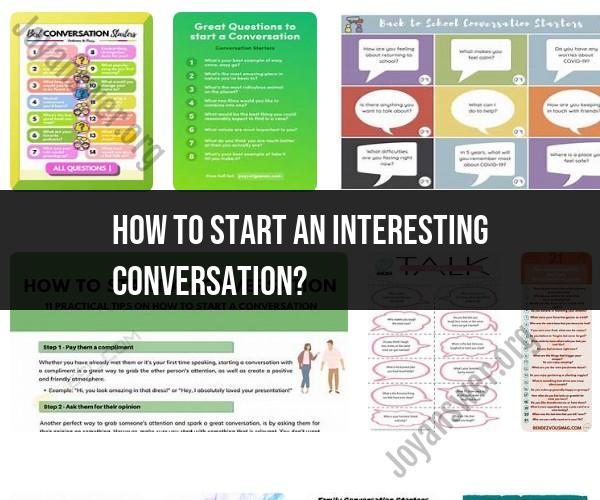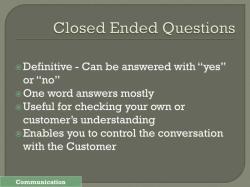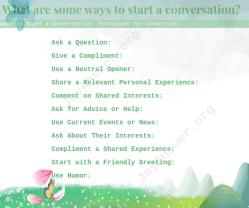How to start an interesting conversation?
Starting an interesting conversation can be a valuable skill in both personal and professional settings. Here are some tips and techniques to help you initiate engaging conversations:
Show Genuine Interest: One of the most important factors in starting an interesting conversation is showing a genuine interest in the other person. Ask yourself what you genuinely want to know about the other person or their thoughts.
Start with a Friendly Greeting: Begin with a warm and friendly greeting, such as "Hello," "Hi," or "How are you today?" A friendly tone sets a positive tone for the conversation.
Use Open-Ended Questions: Instead of asking yes-or-no questions, ask open-ended questions that invite the other person to share more information. For example, instead of asking, "Did you have a good weekend?" you could ask, "What did you do over the weekend?"
Listen Actively: Pay close attention to the other person's responses. Active listening shows that you are engaged and interested in the conversation. It also provides cues for you to ask follow-up questions or provide relevant comments.
Find Common Ground: Identify shared interests, experiences, or topics that you both have in common. Discussing commonalities can create a sense of connection and make the conversation more engaging.
Use Compliments: Compliments can be an excellent conversation starter. Genuine compliments about someone's appearance, achievements, or qualities can make them feel appreciated and open to conversation.
Ask About Their Opinion: People often enjoy sharing their opinions on various topics. Ask for their thoughts on a current event, a book, a movie, or a recent trend. This can lead to interesting discussions.
Share Personal Stories: Sharing a personal story or anecdote can be a great way to break the ice and make the conversation more relatable. Just be sure the story is relevant to the topic at hand.
Use Icebreakers: Icebreakers are questions or prompts designed to get people talking. They can be particularly helpful in group settings or when meeting new people. For example, "What's the most interesting place you've traveled to?"
Avoid Controversial Topics: In initial conversations, it's often best to avoid controversial or sensitive topics, such as politics and religion, unless you know the other person's preferences and boundaries.
Be Mindful of Body Language: Pay attention to your body language, as well as the other person's cues. Maintain eye contact, use a friendly tone, and avoid crossing your arms, which can signal defensiveness.
Stay Positive: Keep the conversation positive and light-hearted. Positivity tends to be more inviting and enjoyable for both parties.
Ask Follow-Up Questions: When the other person shares something interesting, ask follow-up questions to delve deeper into the topic. This shows that you are actively engaged in the conversation.
Be Patient: Sometimes, interesting conversations take time to develop. Don't rush; let the conversation flow naturally.
Practice Empathy: Try to understand the other person's perspective and feelings. Empathizing with their experiences can lead to more meaningful conversations.
Remember that starting an interesting conversation is not just about what you say but also about how you listen and engage with the other person. Be present in the moment, be curious, and be respectful of their boundaries and interests.
Sparking Interest: Strategies to Begin an Intriguing Conversation
Starting a conversation can be daunting, especially if you are talking to someone you don't know well. But there are a few simple strategies you can use to spark interest and get the conversation flowing.
Here are a few tips:
- Be genuine: People can spot a fake from a mile away, so be yourself and let your personality shine through.
- Ask open-ended questions: Avoid asking questions that can be answered with a simple yes or no. Instead, ask questions that require the other person to elaborate and share their thoughts and opinions.
- Find common ground: One of the best ways to get someone talking is to find something you have in common. This could be anything from your interests to your work to your background.
- Be a good listener: Don't just wait for your turn to talk. Pay attention to what the other person is saying and ask follow-up questions.
- Be positive and upbeat: A positive attitude is contagious. People are more likely to want to talk to someone who is friendly and optimistic.
The Science of Conversation: How to Start and Sustain an Engaging Chat
There is actually a science to conversation. Researchers have found that certain types of questions and conversational techniques are more likely to lead to engaging and meaningful conversations.
For example, studies have shown that people are more likely to respond to questions that are personal, relevant, and open-ended. They are also more likely to be interested in conversations that are about their own experiences, goals, and values.
Here are a few science-backed tips for starting and sustaining an engaging chat:
- Start with a compliment: People love to receive compliments, so starting a conversation with a genuine compliment is a great way to make a positive impression.
- Ask about the other person's day: This is a simple but effective way to start a conversation and learn more about the other person.
- Ask about the other person's interests: Once you have a basic understanding of the other person's interests, you can start asking more specific questions. This will show that you are interested in getting to know them better.
- Share your own experiences and stories: People are more likely to open up to you if you share your own experiences and stories. This will help to build rapport and create a more two-way conversation.
- Be an active listener: Pay attention to what the other person is saying and ask follow-up questions. This shows that you are interested in what they have to say and that you are valuing their input.
Building Rapport through Conversation: Techniques for an Interesting Start
Building rapport is essential for having a successful conversation. Rapport is a feeling of trust and connection between two people. When you have rapport with someone, you are more likely to feel comfortable sharing your thoughts and feelings with them.
Here are a few tips for building rapport through conversation:
- Be respectful: Treat the other person with respect, even if you disagree with them.
- Be genuine: Be yourself and let your personality shine through.
- Be interested in the other person: Ask questions and listen attentively to their answers.
- Find common ground: Look for things you have in common with the other person, such as shared interests or experiences.
- Be positive and upbeat: A positive attitude is contagious. People are more likely to want to talk to someone who is friendly and optimistic.
By following these tips, you can learn to start intriguing conversations and build rapport with people from all walks of life.













